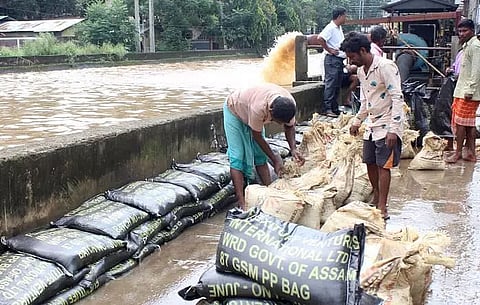
- Home
- Live Blog
- Breaking News
- Top Headlines
- Cities
- NE News
- Sentinel Media
- Sports
- Education
- Jobs

The Central government promotes sponge cities by incentivizing survey of water bodies to assess existing status and to prepare plan for their rejuvenation. Developing Guwahati as a sponge city can be an ideal solution to its recurring annual flash floods, but this can be possible only if city's wetlands are rejuvenated. Ironically, the city does not have a sewerage network for conveying sewage and there is no Sewage Treatment Plant (STP) in operation, without which rejuvenation of its wetlands is not possible. Sponge cities are perceived as effective solution to urban flash floods by way of increasing the water absorption and retention capacities of wetlands, rivers etc., for which adequate budgetary allocations are needed. The Guwahati Metropolitan Development Authority (GMDA) floating a bid for rejuvenation of Borsola Beel has triggered fresh hopes of authorities experimenting with the sponge city option to increase its rainwater retention capacity to build resilience against flash floods. The GMDA has proposed to set up an STP on pilot basis for rejuvenation of Borsola Beel, a wetland in the heart of the city, and treatment of its polluted water. Existing STP of 1.5 MLD (Million Litres per Day) capacity lying defunct speaks volumes about sewage treatment not being on the list of priorities for the city authorities. The poor environmental status of Borsola Beel demonstrates how wetlands in the city have been reduced to drainage channels. Drains connected to city's wetlands carrying sewage, waste and storm water discharge directly into these waterbodies. Accumulation of heavy load of silt/sludge, solid waste has reduced the water retention capacity while water of these wetlands is polluted due to discharge of untreated waste water through the connected drains. Operationalization of the proposed STP will facilitate treatment of water before it is discharged to wetlands, thereby helping gradual restoration of water quality and revival of aquatic lives. Construction of diversion channels will be required for redirecting wastewater first to the STP for treatment before outfall into the wetland. Improvement in solid waste management in the city and sewerage network will be critical to achieving optimal performance of the STP to be set up for rejuvenation of Borsola Beel. The capital city, with an estimated population of 12 lakh, generates solid waste of about 550 tonne per day (TPD). The Guwahati Municipal Corporation submitted before the Gauhati High Court through an affidavit in connection with a public interest litigation and suo moto writ that the construction of a 150 TPD Compost and RDF (Refuse Derived Fuel) Plant is likely to be commissioned in the month of June, 2023 on a plot of 120 bighas at the Boragaon solid waste management facility. The court was informed that the construction work STP is progressing smoothly, and pace of execution will determine if the target deadline set by the court is going to be met as stated by the GMC. Early execution of this plant is vital for preservation of Deepor Beel, the lone Ramsar site in Assam, as the city's garbage dump site at Boragaon is just 500 meters away from the wetland. Given the quantity of solid waste generated by the city, more STPs are required to be set up. The city receives heavy rainfall from July to September and records 180 cm of annual rainfall. Due to encroachment of hills and cutting of hill slopes and trees, a huge load of silt cascades down the hills and carried into the rivers Bharalu and Bahini and the city's drains, which outfall into the wetlands. The problem has worsened over the decades with rapid rise in the population of hill dwellers on account of increase in migrant population associated with service sectors. This has reduced discharge capacities of the Bharalu and Bahini and water retention capacities of wetlands. De-silting and rejuvenation of the two rivers and wetlands are essential to change the situation, but can be achieved only by undertaking comprehensive soil conservation measures in the hills. Affordable housing solutions to cater to the requirement of the burgeoning migrant population must be linked to addressing the city's recurring problem of flash floods by turning it into a sponge city through rejuvenation of wetlands and the rivers. Delay in execution of the proposed projects will make the problems of waterlogging, siltation of waterbodies and degradation of ecosystems of the wetlands and the rivers unmanageable making the city unliveable. Regular maintenance of STPs will be needed to ensure their operation at optimum level. Strict enforcement of the ban on Single Use Plastics is crucial to improve solid waste management and reduce plastic pollution, but no visible efforts are seen to enforce the prohibition. With climate change impact resulting in climate extremes like large excess rainfall over short duration compounding the problem of flash floods and waterlogging in Guwahati, developing it as a sponge city needs to be prioritized in the city's master plan.